Dark money think tank behind Liz Truss was on British media 5,000 times in past year
Exclusive: MP writes to BBC and Ofcom after Tufton Street’s Institute of Economic Affairs - which does not declare its donors - reported a massive increase in media appearances
The Institute of Economic Affairs appeared on British media an average of 14 times a day in the last year, this newsletter has found.
The influential Tufton Street think tank does not declare its donors but has received funding from oil companies, Big Tobacco and US climate change denialists.
One of the IEA’s own alumni previously accused it of hiding behind its charity status to “lobby” for corporate interests.
Whoever is bankrolling it, the IEA’s media operation has certainly grown: the institute’s latest annual accounts, released earlier this week, show that it had 5,265 media hits in the past year, 43% higher than its previous peak in 2019.
Scottish National Party MP Alyn Smith told me that “broadcasters, and especially the BBC, should deny platforms to these dark money lobbyists unless and until we know who they’re actually speaking for.”
After we spoke, the Stirling MP wrote to both Tim Davie, director-general of the BBC, and the head of Ofcom, Melanie Dawes, seeking reassurance that broadcasters and regulators “view the relevant guidelines as fit for purpose” to ensure that the agenda of dark money think tanks “are apparent to the viewer or listener.”
“Surely such organisations being platformed by broadcasters, and the BBC in particular, should be fully transparent about who is paying them and who they represent,” Smith wrote in a letter attached to the bottom of this newsletter.
The IEA, Britain’s oldest free market think tank, has exerted significant influence on British politics in recent years.
Before she became prime minister Liz Truss was a regular at IEA events, and even had a standing Monday lunch date at the IEA’s offices on Lord North Street, around the corner from Tufton Street where most of Britain’s anonymously-funded think tanks are based.
After Truss was made prime minister, Tim Montgomerie, the founder of Conservative Home, tweeted that the IEA had “incubated” Truss – and former chancellor Kwasi Kwarteng – when they were junior MPs.
More recently, as I reported, Truss has a number of IEA veterans on her self-styled Growth Commission, including co-chairman, lobbyist Shanker Singham.
Truss also reportedly put IEA director general Mark Littleweood forward for a peerage in her resignation honours list - but Littlewood, who left the IEA recently, said he was rejected by the House of Lords appointment committee.
In 2018, Littlewood told undercover journalists from Greenpeace Unearthed that the IEA was in “the Brexit-influencing game” and offered to facilitate meetings with British cabinet ministers on behalf of a fictitious US agriculture investor. That same year, IEA was forced to withdraw its ‘Plan A+’ Brexit report after the charities watchdog launched an investigation into it.
The IEA’s latest accounts show income of £2.3m in the year to March 2023 - a slight decrease on the previous year - but single out its media performance, and the number of former IEA staff now working in the UK media.
“The team saw the departure of Emily Carver to GB News and Annabel Denham to the Telegraph, joining our growing pool of alumni with promising careers in British media,” the accounts state.
The IEA is not fond of all media. In 2021, Ofcom rejected a complaint made by the IEA after James O’Brien described it as a “hard-right lobby group for vested interests of big business, fossil fuels, tobacco, junk food” on his LBC show. Ofcom ruled that O’Brien had not distorted the facts. (Full disclosure: I was James’s guest discussing the IEA on that show)
Last year a clip of the IEA’s Matthew Lesh refusing to tell another LBC presenter who funded the institute went viral.
Unlock Democracy’s Tom Brake told me that “too many of the prominent think tanks refuse to provide any real detail about who funds them and their funders' motivations and business interests.”
“Until they are required by law to reveal their backers or do so voluntarily, the media should engage their journalistic skills and curiosity, refuse to label think tanks independent and, instead of taking their research or findings at face value, question their impartiality.”
The Institute of Economic Affairs has yet to respond to my request for comment.





Need to know basis obviously 🤔🤔🤫